Front Cover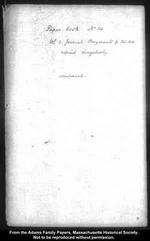
Paper book No. 14
Vol 3. Journal Fragments p 25-44.
copied irregularly.
[The preceding text was added in the handwriting of Charles Francis Adams]
compared.
[The preceding text was added in the handwriting of Charles Francis Adams]
Inside Front Cover
Page 1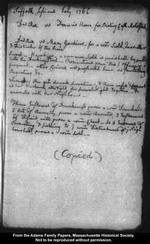
Suffolk Sessions July 1766
Dus. [Dominus] Rex vs. Francis Keen, for stealing Cask Molosses.
Dus. Rex vs. Mary Gardiner, for a common Scold, Quarreller and Disturber of the Peace.
Sewal. Hawkins -- a common Scold is punishable by putting into the Ducking Stool. Prosecutions rare, tho the offence frequent. Other Crimes, not prosecuted here, as forestalling, Regrating &c.
[Wescan?]. She gets drunk sometimes, and then curses and swears at her Husband, all Night, for several Nights together, and quarrells with her Neighbours.
Three Instances of Drunkeness prove a common Drunkard, 3 Acts of Barratry, prove a common Barrator, 3 Instances of Desceit, will prove a common Cheat. So 3 Instances of Brawling and Scolding to the common Distrubance of the Neighbourhood, proves a common Scold.
Page 2
Page 3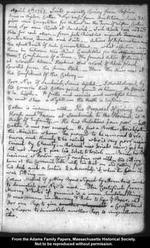
APRIL 4TH. 1767.
Suits generally Spring from Passion. Jones vs. Bigelow, Cotton and Nye arose from Ambition. Jones and Bigelow were Competitors for Elections in the Town of Weston, Cotton and Nye were Rivals at Sandwich. Such Rivals have no Friendship for each other. From such Rivalries originate Quarrells Contentions, Quarrells and Suits. Actions of Defamation are the usual Fruits of such Competitions. What affection can there be between two Rival Candidates for the Affections of a Town Confidence of a Town. The famous Action of slander at Worcester between Hopkins and Ward, of Rhode Island, Sprouted from the same Stock. There the Aim was at the Confidence of the Colony.
Poor Nye of Sandwich, seems dejected. I should suspect by his Concern that Cotton gained Ground vs. him. He seems to be hipp'd. It fretts and worries and mortifies him. He cant sleep a Nights. His Health is infirm.
Cotton is insane, wild. His Proposal of giving his House and Farm at Sandwich to the Province, is a Proof of Insanity. He has Relation that are poor. Jno. Cotton is now poor enough. He has a Brother Josiah Cotton the Minister whom he procured to be removed to Woburn, and thereby to be ruin'd, who is very poor, maintained by Charity. Roland was Josiahs ruin; yet he did not choose to give his Estate to Josiah. Besides his Behaviour at Boston upon that occasion, was wild. His sitting down at the Council Table with his Hat on and Calling for his Deed and a Justice to acknowledge it, when the Council was sitting.
Cottons Method of getting Papers Signed by Members, in order to demolish poor Nye is new. The Certificate from Murray and Foster if genuine is a mean, scandalous Thing. It was mean in Murray and Foster to sign that Paper. For one [Representative] to give Another weapon to a Constituent a Weapon to demolish another Rep., is ungentlemanlike.
Page 4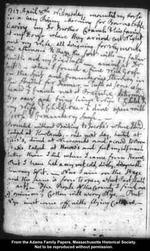
1767 APRIL 8TH. WEDNESDAY.
Mounted my Horse in a very Rainy Morning for Barnstable leaving my Dear Brother Cranch and his family at my House where they arrived last Night, and my Wife, all designing for Weymouth this Afternoon to Keep the fast with my father Smith and my Friend Tufts. Arrived at Dr. Tufts's, where I found a fine Wild Goose on the Spit and Cramberries stewing in the Skillet for Dinner. Tufts as soon as he heard that Cranch was at Braintree determined to go over, and bring him and Wife and Child and my Wife and Child over to dine upon wild Goose and Cramberry Sause.
Proceeded without Baiting to Jacobs's where I dined. Lodged at Howlands. Rode next day, baited at Ellis's, dined at Newcombs and proceeded to Barnstable, lodged at Howes's and feel myself much better than I did when I came from Home. But I have had a very wet, cold, dirty,disagreable journey of it. -- Now I am on the stage and the scene is soon to open, what Part shall I act? -- The People of the County I find are of opinion that Cotton will worry Nye. But Nye must come off, with flying Colours.
Page 5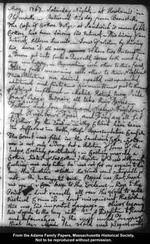
MAY [16], 1767. SATURDAY NIGHT.
At Howlands in Plymouth. Returned this day from Barnstable. The Case of Cotton and Nye at Sandwich is remarkable. Cotton has been driving his Interest. This driving of an Interest, seldom succeeds. Jones of Weston, by driving his, drove it all away. [illegible] Where two Persons in a Town get into such a Quarrell, [illegible] both must be very unhappy - Reproaching each other to their faces, relating facts concerning each other, to their Neighbours. These Relations are denied, repeated, misrepresented, additional and fictitious Circumstances put to them, Passions inflamed. Malice, Hatred, Envy, Pride fear, Rage, Despair, all take their Turns.
Father and son, Uncle and Nephew, Neighbour and Neighbour, Friend and Friend are all set together by the Ears. My Clients have been the Sufferers in both these Representative Causes. The Court was fixed in the Sandwich Case. Cotton is not only a Tory but a Relation of some of the Judges, Cushing particularly. Cushing married a Cotton, Sister of Jno. Cotton, the Register of Deeds at Plymouth. Cushing was very bitter, he was not for my arguing to the jury the Question whether the Words were Actionable or not. He interrupted me - stopped me short, snapd me up. -- "Keep to the Evidence -- keep to the Point -- dont ramble all over the World to ecclesiastical Councils - dont misrepresent the Evidence." This was his impartial Language. Oliver began his Speech to the jury with -- "A Disposition to slander and Defamation, is the most cursed Temper that ever the World was plagued with
Page 6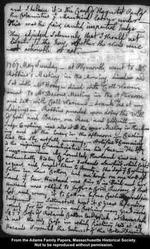
and I believe it is the Cause of the greatest Part of the Calamities that Mankind
labour under." This was the fair, candid, impartial Judge. They adjudged solemnly, that I should not dispute to the Jury, whether the Words were actionable or not.
1767 MAY [17] SUNDAY.
At Plymouth, went to Mr. Robbins's Meeting in the Morning,
[illegible] and sat with Mr. Hovey. Dined with
Coll. Warren. Went to Mr. Bacons Meeting in the Afternoon and
satt with
Coll. Warren. Drank Tea at my Lodgings. Robbins preached upon doing the Will of God, and Bacon on Peace, and Goodwill. Judge Cushing was also at the Upper Meeting in the Morning and at the lower, in the Afternoon. Cushing has the sly,
artfull, cunning -- Artifice and Cunning is the reigning Characteristic in his face. The sly Sneer. -- My Landlady Howland gives me a
melancholly History of her Husbands Lawsuit, which lasted 20 Years, and brought him to Poverty. She says that Cushings father in Law Cotton, had an House on one
Lott of Land that her Husband was Heir to
in Tail, and her Husband was obliged to suffer a Common Recovery of that Lot and convey it to Cotton before Cushing would give Judgment. Saltonstall kept it 5 Years depending merely for his Opinion and Cushing many Years more. So that the Case of
Roland Cotton last Week at Barnstable is not the only Case in which Cushing has at all Hazards supported the Interests of the Cotton Family.
Page 7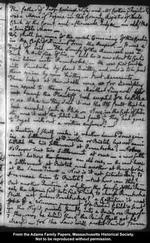
The father of Judge Cushings Wife, and Mr. Cotton the Register &c. was a Man of Figure in this County, Register of Deeds, Clerk of the Court and afterwards Judge -- an odd,
'tho a sensible Man.
We shall see more of the cursed Cunning of this Cushing in the Case of Dumb Tom the Pauper. It was a Trick of his. The Secresy of the Removal was a Trick and Artifice of his. And he is now about to Certiorari him into Pembroke. He was first sent into Pembroke by secret Deviltry, and now is to be sent there again by open Deviltry. But Memento -- Three judges at Barnstable were for dismissing an Appeal to them from Marthas Vinyard because the Plaintiff had accepted of a bad Plea or no Plea. They said it was the Plaintiffs fault that he had accepted such a Plea. Now in the Case of Scituate, was it not the Select Mens fault that they had gone to Tryal without a written Answer?
A Question I shall make is, whether dumb Toms gaining a Settlement, at Tiverton or Bristol, has not annihilated his Settlement at Pembroke?
[illegible] No Pauper has two Settlements at once -- a new settlement destroys
the former an old one. He cant have a Settlement at Bristol and another at Pembroke at the same Time. Now is it not Scituates Duty to remove him to Bristol? But how can they? -- But another Question is whether the
secresy of the Removal, the Manifest Artifice and Trick, to charge Pembroke, shall not screen Pembroke? A Collusion it was. If a Woman pregnant of a Bastard Child is sent in the Night, private secretly into a Parish on Purpose that she may be delivered there, the Parish shall not be charged -- for the Law will protect Parishes from
Page 8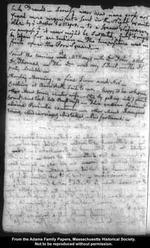
such Frauds.
Secresy never was more gross, nor fraud more manifest. Sent in the Night, 18 months old, by the Mother and a Negro, to a Squaws Wigwam, on purpose that it never might be suspected, but that it might be taken for an Indian. The Imposition was infinite upon the Poor Squaw.
Spent the Evening at Mr. Hoveys, with Deacon Foster and Dr. Thomas. The Deacon was very silent. The Dr. pretty sociable.
MONDAY MORNING [18 MAY].
A fine Sun and Air.
Cushing at Barnstable said to me -- happy is he whom other Mer Errors, render wise. -- Otis by getting into the general Court, has lost his Business. -- Felix quem faciunt aliena Pericula cautum -- other Mens Dangers, Errors, Miscarriages, Mistakes, Misfortunes.
Page 9
Pages 10 -32
[Blank pages -- no images available]
[Pages 16-32 have not been cut.]
Inside Back Cover
[Blank page -- no image available]
Back Cover
[Blank page -- no image available]








